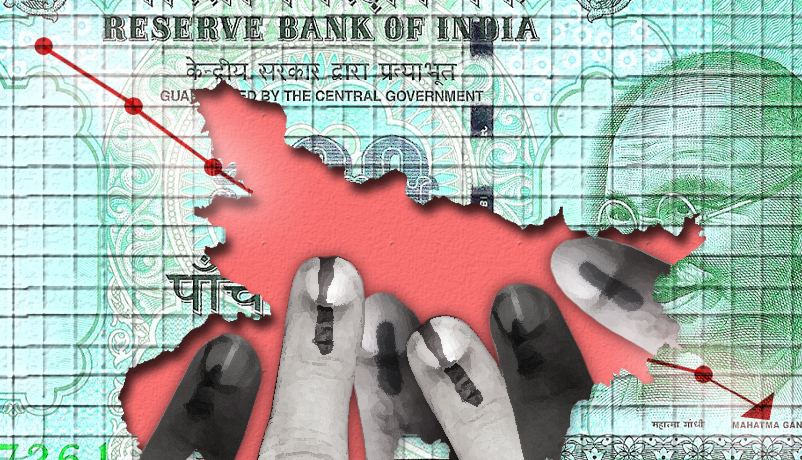To Modi from Bihar: Cut the vitriol and get down to work

The jolt
- The Bihar results may take their toll on the markets
- The NDA\'s loss is likely to hit the Sensex hard
The track record
- The Modi narrative has floundered on the economy
- The economic community\'s confidence has been dented
More in the story
- What went wrong with the government\'s image
- How the government can get its game right
The verdict of the Bihar polls took a toll on the Indian markets. On Monday morning, the Sensex opened more than 600 points down.
Stock markets, anyway, prefer a strong central government and the defeat in Bihar goes against that narrative.
But if you are not a speculative investor - in search of a quick buck, driven by sentiments, not fundamentals - this is perhaps the time to think long-term. The right-wing government is expected to come back to its sense and focus on falling Indian exports, rather than cows.
By the second half of 2013, economists as well as industrialists wanted a strong government at the Centre in 2014 to pep up the Indian economy, lying dormant due to the Manmohan Singh government's 'policy paralysis'.
As the Modi wave gripped the country ahead of the Lok Sabha Polls, the BSE Sensex jumped 33% between September 2013 and May 2014 when Narendra Modi was sworn in as the Prime Minister with a brute majority of 343 seats in Lok Sabha.
The celebrations continued in the coming months as the Sensex crossed the psychological mark of 30,000. Blown by the overwhelming sentiment, a business magazine called it the 'Mother of all Bull runs', predicting that a strong government led by a powerful leader like Modi will pitch India to take on the Chinese juggernaut.
The NDA government was well versed with the art of fueling sentiments of the stock markets. It launched campaigns like Make in India, Swachh Bharat and Digital India with banner and jacket advertisements in newspapers.
Need for consensus
But a transitional economy like India's can't run on government campaigns. It requires efforts and support from the Opposition as well.
The high-headed behaviour of the NDA government antagonized the Opposition inside Parliament. It cost the government the Goods and Service Tax Bill and the Land Acquisition Bill. This led to panic among foreign investors as well as the Indian industry.
Soon the markets started to tumble on cue from global economies, even as Finance Minister Arun Jaitley kept repeating that the Indian economy was equipped to deal with the crisis.
Instead of learning to work within a democratic set-up, where the Opposition and the ruling party work together on country's policies, the NDA pursued a communal agenda, hoping to increase its presence in the Rajya Sabha by winning Bihar and Uttar Pradesh.
The communal strategy perturbed foreign investors even more. They realized that the government was banking on a wrong narrative to convince a democracy that was still dwindling between License Raj and a liberal economy.
The controversy surrounding the warning from Moody's Analytics through its report exposed the government's desperation in the face of losing trust among the people who had voted it to power. Instead of taking Moody's advice as a point of introspection, the government took a combative stance against the organization.
The Bihar verdict has a message for Modi: Be tolerant, rein in the loonies and focus on the job at hand
While doing this, the government forgot that the Moody's Analytics represented the same investors' community that Modi wants to invite for 'Make in India'.
Moody's warning that the government runs the risk of losing popular support if Modi fails to reign in his ministers from making hate speeches against minorities has been vindicated in the Bihar results.
This loss should bring the government back to its senses and Modi should understand that he was given a mandate for making the economy stronger by taking all communities and their representatives together.
Hopefully, Prime Minister Modi will take out time to re-think his strategy.
First published: 9 November 2015, 11:59 IST






![BJP's Kapil Mishra recreates Shankar Mahadevan’s ‘Breathless’ song to highlight Delhi pollution [WATCH] BJP's Kapil Mishra recreates Shankar Mahadevan’s ‘Breathless’ song to highlight Delhi pollution [WATCH]](https://images.catchnews.com/upload/2022/11/03/kapil-mishra_240884_300x172.png)

![Anupam Kher shares pictures of his toned body on 67th birthday [MUST SEE] Anupam Kher shares pictures of his toned body on 67th birthday [MUST SEE]](https://images.catchnews.com/upload/2022/03/07/Anupam_kher_231145_300x172.jpg)






